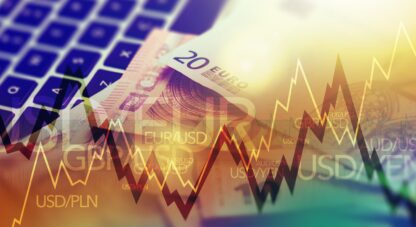Podcast: Play in new window
- Japan Is Buying Russian Oil, Ignoring US Mandate
- Unrealized Losses Are Getting Harder To Hide
- Accounting Chicanery Or Making Earnings The Pretty Pig
Has The Petrodollar Lost Its Teeth?
April 5, 2023
“The world changes slowly outside of crisis dynamics. The real question is, if we do step into a crisis, is that the context where things begin to change quickly? It’s only crisis that compresses time and moves forward all clocks. Can we avoid a geopolitical crisis, because that has the potential for compressing time?” — David McAlvany
Kevin: Welcome to the McAlvany Weekly Commentary. I’m Kevin Orrick along with David McAlvany.
There are some weeks when there’s just so much to talk about, but terms change sometimes. When you think something is too good to be true, and it just keeps happening, and it just keeps happening, a lot of times, it is too good to be true, and the wake-up call comes. I can’t help but think that this last week, the wake-up call is really coming through. Rising interest rates, rising gold, the fear right now in the banking system, we’re just feeling it with all these calls that are coming in.
David: It’s important to get definitions on things. Even the way people use words, there’s connotations and definitions which you may need to get clarification on and not just assume that someone is saying the same thing that you think they’re saying.
Kevin: My wife and I, when our daughter was just in a stroller, we took her to, I think it was called Taste of Denver. Remember those days?
David: Mm-hmm.
Kevin: They had carnival stuff and all that. Well, I remember I’m a dart player. You and I have played darts before. There was one of those throw-a-dart-at-a-balloon stands. I walked up to it, and the guy goes, “Here, go ahead and try it for free.” I looked at him. I was like, “What? Try it for free?” He goes, “Yeah. Try it for free.” So, of course, I hit the balloon, and I get a prize. I’m like, “Wow, this is too good to be true,” and he hands me another dart. He didn’t say whether it was free, but he did it in the same manner. I mean, he had practiced this many times.
So I ended up popping a lot of balloons, and the teddy bear kept getting bigger, and the prize was really big. I was like, “This feels too good to be true,” and then he told me what I owed him. It was ridiculous. He had never ever said that I was actually going to be having to pay for this. I’m looking right now at all that’s going on, like the banks who locked in these rates at low rates. You’ve got real estate that’s been locked in at almost zero rates, and now, we’ve got rising interest rates. It’s almost like the carny at the carnival going, “Now, let me tell you what you owe me.”
David: Right. Well, there is a price to pay, and while it’s not always the case, it frequently happens that financials lead the broader market on the way up and on the way down. Many assets have a sensitivity to interest rates. Banks more than the average industry given that their entire business model is like a leveraged play on interest rates.
Kevin: Right. They’re highly leveraged, aren’t they?
David: Yeah. Ten times leveraged, 12 times leveraged, 20 times leveraged. This is not uncommon among commercial banks to have a very small capital base, but a very significant portfolio of assets that dwarfs it by comparison. Financial institutions like Lehman carried upwards of 40 times leverage, and obviously, when things go wrong, they go badly wrong depending on how much leverage you have.
So thinking of banks as canaries in the coal mine, I think that can be a useful exercise. The rates carnage of 2022 has revealed the weakest players first, and these are companies—or banks, really—that were caught asleep at the wheel, maybe with the most disgraceful risk management approaches. But that’s now baked into the cake. We understand the risk is there. Inherent to the banks is a leveraged play on rates, which creates unique opportunities on one side of a cycle and unique pitfalls on the other side.
Kevin: Yeah, and interest rates affect mergers and acquisitions as well. You’re borrowing money to make the merger happen.
David: Right. So not only is it commercial banks, but you’ve got the investment banks that are doing those deals, and it’s the management of weddings and divorces within the marketplace. Mergers, acquisitions, the occasional spinoff.
Kevin: All purchased on debt. Yeah.
David: Yeah. Subject to special pressures when rates turn higher because if you think about it, it’s easier to get deals done in a declining rate environment. Money is getting cheap, and so the terms are easy. It’s harder as rates climb, both because it alters the math on valuations—and that’s a key point—and also because access to capital can be harder as capital costs are increasing. So whether it’s business as usual at a commercial bank or deal flow as usual at an investment bank, interest rates have a material effect on strength and weakness.
Kevin: Of course, everything runs on credit. What does this do to corporate America?
David: Yeah. The secondary impact is in that space, in corporate America more generally. You can grow a company organically, or you can grow through mergers and acquisitions. So what is the price you’re paying for this company that you’d like to acquire? Valuations change with the cost of capital. Deals are harder to get done when valuations are changing as a result of that.
I mean, think about it. From the acquisition side, you may say, “Well, I like the fact that valuations are becoming more attractive,” but the person who may sell their business is less interested in selling if valuations are shrinking. So it’s also true in real estate as well. Multiples matter. Valuations matter. Classically, both of those, they contract, they shrink as interest rates are on the rise.
Kevin: When you talk about real estate, a lot of times, we think of our house, and we think, “Ah, I’ve got a 30-year loan. I’ve got it locked in.” But commercial real estate doesn’t really operate at that. They have to continually refinance, do they not?
David: Yeah. We highlighted the $400 billion in commercial real estate refinancing that is in line for 2023. That’s followed by the $500 billion next year, and as I understand it, an additional $600 billion in 2025. So a total of about $1.5 trillion over three years. We’re talking about 65% to 68% of the commercial properties financed by small and intermediate banks have refinancing needs over the next 36 months.
Kevin: At much higher rates.
David: As rates increase, the valuations on the property in need of refinancing come under pressure. Translation: for the bank, what’s the collateral value? We’ve got to look at the numbers differently. The loan to value of the asset is shifting. So it’s not so much that credit becomes unavailable as rates increase, although that can be the case, but rather, when you have an asset like commercial real estate that needs refinancing, the loan is relative to the freshly assessed value of the asset, which is a progressively lower number as rates increase. So the refinance is the reveal. The refinance is the reveal on what a property has or does not have in terms of equity.
Kevin: So when you say reveal, it’s a little like what we had revealed three weeks ago with Silicon Valley Bank. The reveal was that they had unrealized losses. When you have to refinance, you realize those losses, don’t you?
David: Yeah. It’s just that moment where a reality which is the case whether you know it or not becomes obvious to you, right?
Kevin: Yeah.
David: So something exists without your awareness of it, that doesn’t mean it doesn’t exist. It just means that you’re not aware. So the reveal is when it gets refinanced, the property may or may not have the same equity which, all of a sudden, is a game-changer for the property owner. If the assessed value is low enough—and equity can go negative, we’ve seen that happen—owners will often walk away from the property, leave the bank with the asset.
Kevin: We saw that back in 2007.
David: Yeah. Now, there is a major difference between residential real estate and commercial real estate because when a family purchases a home, they typically finance at a subsidized rate. If you think about conforming loans, those end up getting sold off to your government-sponsored entities, right? And they’re there for 15 or 30 years.
Kevin: Yeah. What about those adjustable mortgages though that tease you in?
David: Yeah. Well, if you’re foolish enough to use the adjustable teaser rate, these are people who are going to get hammered because all of a sudden you can’t think about a fixed rate for 15 or 30 years. See, what happens a lot of times is that families will have the opportunity to refinance at a lower number. So where they start is not necessarily where they finish. Here we are coming off of 5,000-year lows in interest rates, and as rates begin to climb, you’re not going to have the opportunity to refinance to your advantage—but you also don’t have the need to if you financed originally at a fixed rate.
Kevin: The other reveal. A lot of people are going, “I need to sell my real estate. The real estate is at a high level right now.” But if your loan is at an extremely low value, whatever you buy next, unless you’re just paying it off, you’ve got that new high interest rate.
David: Well, that’s right. The average purchase is made, and the buyer only cares about the value of the home if they consider moving. In which case, you get what you get for the house that you sell, but you don’t retain your low rate. It gets reset with your next purchase. So your cash flow on a monthly basis may look very, very different if you decide to move. Again, there’s a difference between the residential setup and commercial properties, which are rarely, if ever, financed for 15 or 30 years. You see a lot more 3-, 5-, 7-, 10-year type structures, and some of them are adjustable rates at a certain point.
So banks are far more sensitive to the inflation risk and a change in an interest rate environment with commercial loans because they retain a lot of that debt. Residential properties, they’re originated oftentimes at a local bank, but then they’re sold off, consolidated into what we know as mortgage-backed securities. Again, that’s rates that are well below an actual reasonable number because the GSEs sponsor and subsidize the rates.
Kevin: Speaking of subsidizing by the government, do you remember Calomiris? You interviewed him, and it’s all politics. I mean, the banking laws actually can be adjusted for political gain. That can slap us in the face.
David: Charles Calomiris was the commentary guest that explored that idea. We looked at his super insightful book Fragile by Design, and I think that’s a must from the archives. If you want to understand a key aspect to the buffoonery in the credit markets, Charles connects the dots—not to the bankers, but to the politicians that set the rules for the bankers along politically expedient lines. If you didn’t listen to that episode, do yourself a favor. Politically directed credit is a thing of the past, it is a thing of the present, and it is most definitely a thing of the future.
Kevin: So when you started this podcast, Dave, back in 2008, when we started talking about this, you said we want to highlight the sequence from the financial to the economic, and then to the political, and then to the geopolitical or geostrategic—however you want to look at that. The financials— You started today talking about the financials being a leading indicator. Well, we were doing the podcast back in 2008. It was like two or three years after the financials had actually given a tell that we were going to have the global financial crisis.
David: Yeah. Coming back to how the behavior of financials precedes the broader markets, banks peaked in price in December of 2006—well in advance of the 2008–2009 global financial crisis. So given the significance of the Silicon Valley Bank to the world of venture capital, I can imagine that the tech ecosystem is impaired from the bottom-up going into the next 12 to 18 months.
Look, tech has rallied since the beginning of the year. Let’s call it 20% for the Nasdaq-100. That still needs to recover over 50% just to make up last year’s losses. Keep that in mind. But given the pressure of all banks in the first quarter of 2023, I suspect the general equity market has a hell of a time by the third and fourth quarter. To me, building a bear case for equities is getting closer and closer to the proverbial shooting fish in the barrel. It’s never quite that easy, but all the same, you have a multidimensional case from a technical standpoint looking at the charts, the fundamental standpoint looking at operational profitability with individual companies and within individual key sectors and from a credit standpoint.
So as it stands, coming into the second quarter, the KBW Bank Index has suffered a 45% decline. It’s come from $150 a share to $80 a share, and the individual names like First Republic down from a peak not that long ago of $223 a share—this is prior to the Powell and Fed rate hiking cycle—now it’s $14 a share.
Kevin: Wow.
David: $223 to $14 is a 93% decline.
Kevin: Or it’s a huge bargain, but I don’t know.
David: Well, a business model that requires leverage for profitability is a dangerous business model. It’s upon that business model that the vast majority of our household savings rest, and the only comfort we have in that context is FDIC insurance. There’s now open criticism of the exclusion of Silicon Valley Bank from the bank stress tests because smaller size, and so now they’re talking about changing that, and maybe it will be everything from $100 billion in assets higher. So that’s what they’re talking about right now, but the crazy thing is that the stress tests, even for the largest banks, did not include rising interest rates as a risk factor.
Kevin: That’s unbelievable because that’s what actually took Silicon Valley Bank down.
David: CNBC’s Steve Liesman asks, “What was the Fed thinking?”
Kevin: Well, it goes back to the political side of things, though. I mean, if you’re really not checking the stress— It was political that these smaller banks weren’t stress tested in the first place. You talked about that a couple of weeks ago. But it’s also political that they don’t test the things that are probably the most vulnerable.
Okay. Going back to free darts and popping balloons, like I said, my prize kept getting bigger and bigger and bigger, and it was like, “Gosh, this is really, really good,” but all these portfolios are vulnerable because they’ve been given free darts with these low interest rates for so many years.
David: Free prize?
Kevin: Yeah.
David: No, there’s a true cost. So the securities portfolios which were seeded with paper from the era of zero to negative rates, it spans more than banks. You’ve got insurance companies. You’ve got endowments. You’ve got foundations both in the US and around the world loaded up on paper. And what was the reasoning behind it? In hindsight you can say, “How foolish was this behavior?” but this is the nature of misallocated capital.
Kevin: Everybody was doing it, though, Dave. Everybody.
David: Yeah, and it has to do with a search for yield. When you take rates to zero, you force investor behavior in the search for filling an income void. So it’s a very predictable behavior, but that’s why you have this paper seeded across all of those industries. Insurance companies, endowments, foundations. Again, it’s a global issue. You have uniform central bank policies which make for uniform investment behavior and a uniform characterization of implicit portfolio risk. Whether there is a revelation of losses—again, marking them to market—that depends entirely on portfolio transparency which may or may not happen. Again, is there a reveal where people go, “Oh, that’s a problem?” Again, the problem exists. The question is whether or not someone is aware of it, and then reacts to it. If you can avoid—
Kevin: Yeah, but the reveal is, “Give me my money.” That’s the reveal, “Give me my money.”
David: That’s one of the reasons why opacity is helpful in cases like this. You don’t want there to be a reveal.
Kevin: Right.
David: Right? So this is why accounting laws can change. Not that they have yet, but the fragility comes to light as and when transparency is introduced.
Kevin: Okay. So banks have depositor flight that they have to look after. Insurance companies, it’s a little slower because they’re just paying policies out, but does that show up?
David: Yeah. Transparency is forced as an issue in the case of depositor flight from a bank. That’s the episode that we had in the last couple of weeks. A forced issue in the case of insurance companies is if they have claims to pay out in excess of their cash on hand. So they can run into the issue of having to liquidate assets to meet those liabilities, and a forced issue in the case of banks and private equity where commercial real estate, which was a buffet staple, particularly bought by private equity groups and in no small measure financed by regional banks. These are factors which are becoming more obvious.
The reveals are happening, and investors are taking action. The desire of investors to get out of the way of the slow motion commercial real estate train wreck, it’s obvious. But the ability to do so is impaired: 1) by the illiquidity of the asset class. And 2) by the illiquidity of the structures that those assets were placed into. I think of BlackRock and their BlackRock Real Estate Investment Trust—another $4.5 billion dollars in redemption requests from investors last month. A mere 15% of that was contractually made available. Everyone else remains in line.
Kevin: So is this the effect of creditism? You remember when Richard Duncan is on? He talks about how money has now been replaced with credit because credit is money. I think Doug Noland has a similar thought.
David: Well, where Doug goes in a slightly different direction is that we have the implied liquidity within the credit markets. He makes this point over and over again: the assumption of liquidity, what he would call the “moneyness” of credit. So, yes, Duncan looks at and explores how the definition of money has changed, where money and credit are now used interchangeably. Right? But Doug’s point is a little different, and it deals with the perception of the person who owns the asset, and they’re assuming the liquidity function is the same.
Kevin: Yeah. There’s the catch.
David: Exactly, and because the purchase of an asset is so easy, you just assume that that sense of moneyness, it was so easy to buy. The implication is that it must be the same process in reverse, so easy to sell. Right? I remember our conversations with Ian McAvity when he was still alive. He once described the emerging market investments: he’s like, “Look, it’s like a four-lane freeway going in. Everybody can buy it. But it’s like a goat trail coming out.” Right?
The capital flows differently, and it’s far more disruptive with the outflows. Private equity peaked. It peaked in terms of investor inflows 12 to 18 months ago, and only now is there a bit of panic setting in, and investors, they’re looking at the fine print of the paperwork. They were so urgently trying to participate in what the foundations were putting money into, and what Yale Endowment was putting their money into, and this or that endowment. All the big guys are doing it. Why shouldn’t we do it, too? We need to increase our allocations. The fine print said, “If you want your money back, you have to get in queue, and we don’t have to give your money back anytime soon.”
So, again, it’s the implied liquidity. It’s the moneyness of credit. It’s the moneyness of all assets where investors assume greater liquidity than there actually is, and so you then come up against the tragic experience of somebody saying, “What do you mean I can’t have my money back?”
Kevin: It’s like having a safe that you know you’re going to remember the combination to, okay, and you’ve got everything you need in that safe, and then you can’t come up with the combination. It’s a wake-up call to people who think they’ve put money into something that they can move it to something else if they need to.
Yeah. I had a client call. He was completely furious because he went down to the bank, and he wanted to take more than $10,000 out of the bank, and they said no. He’s like, “Wait a second. This is my money,” and they said, “No,” and then they showed him that they have—
David: Up to two weeks.
Kevin: Yeah, the fine print. He called me, and there was nothing I could do about that, except for— He just needed somebody to relay the shock and anger. That’s happening right now—however, in the billions—in the commercial space.
David: Yeah. Well, real estate is something that is more fragile than people think. They think, “Yeah. I’d say it is a hard asset.” That’s great. It is a hard asset, but it’s incredibly interest-rate-sensitive, and there’s various things that can help or hurt you, depending on where you’re at. Real estate goes through a boom and a bust in Texas. Why? Well, what’s the price of oil? There are ancillary factors.
Marc Faber highlights what commercial real estate repricing can look like when he looked at a Houston office tower, which until 2019 housed ConocoPhillips. Goldman Sachs put together the commercial mortgage-backed security paper for financing the mortgage. It was about a $76 million mortgage, and that was back in 2014, and investors gladly bought those IOUs, the commercial mortgage-backed securities. Note what a commercial mortgage-backed security— This fits the bill of non-bank lending, where Wall Street constructs the deal, passes it along to investors. They don’t hold it. They just collect these—
Kevin: Isn’t that called shadow banking?
David: Yeah. Exactly. Then, you find individual investors or funds that gobble up that paper. Right?
The office at that time was valued at $121 million. Now that the office is vacant, there are a few issues, to say the least. By 2021, the value of the building was reappraised down from $121 to just $25 million.
Kevin: Wow.
David: Right? It finally sold for $20.6 million. The liquidation and the legal expenses gobbled up $11.7 million of that in fees. So the commercial mortgage-backed security investor who ponied up the $76 million for the original financing of the mortgage, they walked with $9.2 million. Again, original appraisal, $121, and $76 million in the borrowing. A loss ratio of 88.3%.
Kevin: Wow.
David: Vacancies affect commercial values as well. We’re focused on interest rates, but clearly, a property with limited tenants is worth less, and this is a case in point.
Kevin: But you talk about the reveal. If it doesn’t have to be revealed, if you’re in the accounting department and you know magic, you can keep that from happening sometimes until it’s too late.
David: Well, so, like in the case of BlackRock. Let’s just say, for instance, they had properties like that in their portfolio.
Kevin: Right.
David: They don’t have to sell them if there’s no redemption requests. But if the redemption requests exceed the liquidity in the fund, they’re obligated to provide some degree of liquidity.
Kevin: To sell when it said it was. Right.
David: Yeah. The other issue. You know how when you go buy a house, you want to know what the neighborhood is priced at, so you look at comparables? What you’ve just done is you’ve provided comparables for all the other real estate— Even though it’s selling at a distressed price, you’ve just provided a comparable for the market.
Kevin: You’ve added new information to the market that you probably didn’t want to.
David: A reveal.
Kevin: Yeah.
David: Because how does it now negatively affect, in a negative feedback loop, the remainder of your portfolio? Where you were pricing it as 3X, 5X, 10X, maybe it’s only 1X.
Kevin: Okay. So let’s go back to corporate America, though, because the stock market still seems to be riding high. I mean, is there no realization that this could feed into equity prices?
David: Well, I look at them as different things. But if you’re just looking at the broader markets—the equity markets, Bloomberg notes that earnings are now flowing through to corporate America faster than cash is flowing into those same companies.
Kevin: Wow, so their earnings are going up. The cash is less than the earnings?
David: Cash is less than the earnings, and that suggests that we are past the peak in earnings, past the peak in profitability, and already into the timeframe where accounting creativity is required.
Kevin: How much do we think we want to make, not how much are we making?
David: How much do we need to make expectations work here and not disappoint our investors?
Kevin: Wow.
David: So if putting lipstick on the pig is now a first quarter and second quarter requirement, again, where earnings need to look better than the cash flow that’s actually coming into the company, you tell me what the third quarter and fourth quarter becomes. I think we’re talking about a very vulnerable period of time subject to market downdraft. That’s what that means. If earnings show more impressively than actual cash coming through the door, what you’re talking about is accounting chicanery. Creativity is in play.
Kevin: Well, and even the stuff that they’re reporting is right now missing the estimates.
David: Yeah. Morgan covered that in a Hard Asset Insights this weekend. I’d encourage you to go read it. It covered the 68% miss thus far on earnings versus estimates. That’s one reason we’ve got vulnerability to a market downdraft. I think that’s a polite way of saying the bear market decline in the second half of this year could rip your head off.
Does that coincide with the recession which JP Morgan Chief Investment Officer says is inevitable by the end of the year? Probably it does. Morgan summed it up like this: “So here’s the tally: already recessionary and declining consumer sentiment, an inverted yield curve, deeply recessionary leading economic indicators, 250 basis points of lagged rate hike impacts yet to be felt, bank failures, deposit runs, and tightening lending standards—all while, according to EPB Research, four-month average economic growth is already down-trending to the 1% recessionary state that’s typical of a starting point for historical recessions. In other words, today’s broad stock market is far from the investment opportunity of a lifetime.”
Kevin: For the listeners who’ve never met Morgan, he’s actually a very happy, nice guy, very well-educated. But if you read this latest report, you would think he would be completely, completely depressed. But I’m going to take this a different direction because there are people who are heavily in debt right now, and they’re looking at inflation, going, “This is in my favor. I’m paying back with cheaper dollars. I’m beating the system.”
David: Now, I’ve heard that before—heavily in-debt investors and the benefits of inflation. The belief has been expressed to me that the burden of debt is reduced by being able to pay it off with cheaper money. I can’t tell you the number of times in consultations the question has been, “Shouldn’t I have more debt since inflation is on the rise?”
Kevin: Right.
David: There’s some truth in that, but there’s also more to the story. We mentioned the commercial real estate market, and the negative impact to pricing within the real estate genre as a result of rising rates, which, like night follows day, rising rates occur when you have a big boost in inflation. So inflation, then rising rates, right? So what happens to the value of asset prices as you have rising rates? The rise in rates can negatively impact the value of the real estate so that the only way for inflation to really benefit the debtor is for the terms of the loan to be incredibly long-term. It assumes also that nothing disrupts the borrower’s ability to make those payments, or in the case of the US or other governmental body, be a non-asset-backed loan.
Kevin: Okay. So there is a point. I mean, you and I have actually utilized this point. We’ve got low mortgages. I still have a little bit on my mortgage. I put that money into gold instead of paying it off, but I know that I could in a second if I needed to pay it off. So you don’t beat the system by being heavily in debt during a time of inflation.
David: Well, and actually I follow the same strategy as you have. I have ounces.
Kevin: Right.
David: And those ounces, dollar for dollar, match my mortgage balance.
Kevin: Mm-hmm.
David: Well, they were dollar for dollar, except the gold appreciated. So, essentially, I get to pay off the debt at 50 cents on the dollar.
Kevin: Right.
David: I think we’re closer to 35 cents on the dollar now versus my cost basis.
Kevin: But being heavily in debt and not being able to do that, especially with shorter-term loans is disastrous.
David: Yeah. I have a Plan B. My Plan A is pay it off with cash flow, but if something impaired my cash flow, what’s my plan B?
Kevin: Right.
David: Well, I’ve got the other asset which was specifically designated to extinguish the debt.
Kevin: Yeah. So we have small mortgages left on the house. We’ve got gold that we can pay it off with. If we were to walk away, though, there’s collateral there, so we have no reason to walk away from our loan. But the government— Where’s the collateral in the government loans?
David: Yeah, and that’s what I mean. The governmental body— A non-asset-backed loan like Treasury bills, bonds, notes, things like that, that’s not a high risk. But you can see how inflation actually is helpful to them.
Kevin: Oh, sure. Well, that’s the plan. I mean, that was the design, right? Financial repression is the design.
David: That’s right. The last point leads me to a Financial Times article from March 31st. It’s an opinion piece by Adam Tooze. He says, “We’ve entered a new era, one in which thoroughgoing liquidation of financial bubbles is politically unthinkable, and so moral hazard and zombie balance sheets pile up.” Later, he says, “What defines our current moment is neither the bank failures nor the relatively modest bailouts, but the astonishing macro financial switchback of 2020 to 2023.” Finally, he says, “Though no one wants to be seen to be celebrating the inflationary wave, we are, beneath a decent veil of silence, living through one of the most dramatic and powerful episodes of financial repression ever.”
Kevin: Financial repression, just for us to re-talk it through, is to borrow money at a certain interest rate. Then, if you’re a government, print just a little bit more of that money, and create an inflation rate where while you’re paying those loans back, you’re paying it back in the cheaper money. Now, see, that’s the idea we talked about with our mortgage, but the difference is the government is printing money, and they’re putting it on the back of the American public.
David: Well, there’s different versions of repression. I mean, it’s basically an assignment of losses.
Kevin: To the masses.
David: Yeah.
Kevin: Yeah.
David: So you can do that by a couple of ways. I mean, one— Inflation is one expression of financial repression.
Kevin: Artificial low interest.
David: Artificially low interest rates is another, where you get to choose the winner and the loser in the equation. And that financial repression is a policy choice. That’s the conversation we had with the lovely gal from the World Bank.
Kevin: So where’s the beef? Where’s the collateral?
David: Well, the final comment is important to appreciate. What makes our system of over-indebtedness even remotely tenable is the complement of central-bank-created inflation. You can’t have $31 trillion on its way to $50 trillion in debt without seeing the virtue—again, this is from a top-down perspective, so I use that word “virtue” very loosely. But this is where inflation is a virtue. You run all this debt, but you know that you have a solution for it.
Kevin: Right.
David: It may or may not work for the borrower with assets backing the loan, like we were talking about earlier, but the IOU with no collateral, that’s a very interesting animal. So financial repression in the form of inflation, that’s the new iteration. We can’t hold interest rates at zero or negative, that version of repression, any longer. The market won’t allow for it, not in the context of inflation. Now, the inflation is acceptable. We just need to get it at a level where people don’t complain. You complain if it’s 10. You don’t complain if it’s two. So the acceptable rate of repression is below the rate of perception. The subliminal, below the rate of perception level.
The American household is the one that gets hurt. The American government is the one that benefits. So you see this tool of redistribution in the form of inflation. It is an exchange, if you will, of one sort of burden for another. Off the back of Uncle Sam comes the burden of $30 on its way to $50 trillion in debt, and onto the US taxpayer who just has to pay more for everything as the burden of debt is eliminated for the federal government.
Kevin: Because we are a captive audience. We live in this country. We use the dollar. If you’re someone from out of town, let’s call it the Saudi royal family, and you were told back in 1944 that the dollar would be backed by gold, and it would be redeemable for gold, and Roosevelt worked out the little deal where he said, “All right. Make sure that not a drop of OPEC oil is sold for anything but dollars.” Now, we will. It’s redeemable in gold.
Now that this game is up— You talked about IOUs with no collateral. Well, that may work when you’re a captive audience, but that doesn’t work when you’re sitting on a bunch of oil in the Middle East and you’re going, “You know what? These guys have ruined their own currency. We don’t want to play anymore.”
David: Well, this is one of the things that makes gold so interesting to me because it’s something that moves on the basis of greed, on occasion, but also on the basis of fear. And you see it move very differently in different contexts historically. There’s a seasonality to it. Coming through April, typically the April to May period is a strong season. The end of May to June, even through August or September, a weak period, usually, the lows of the year are put in in that timeframe. And then the fall, end of September through October, November, and December. If you’re looking at the contract seasonality for gold, that’s typically what you’ll see, and that’s just normal. Tie it to Ramadan. Tie it to the Chinese New Year celebrations. Tie it to the Indian wedding festivals and that season at the end of harvest. There’s reasons why it moves on a seasonal basis.
But what we’re talking about now, which is super interesting: gold is above the 2,000— psychologically significant level of 2,000. We have yet to break out above 2,070, which is really the line of demarcation for gold. And what is driving it at that point? Is it greed, the desire for gains, or is it fear, the desire to preserve value? Because you look at what is happening around you, and you have questions. You have doubts. There are uncertainty factors which bother you. Maybe it’s geopolitical uncertainty factors. You mentioned the OPEC oil cuts. The signals are clear by the day that US foreign policy and our domestic interests are of little concern for the Saudis and OPEC members.
Kevin: They would’ve never done that without our permission in the past.
David: There’s absolutely no surprise in the surprise cuts. 1.15 million barrels of cuts starting in May. The announcement did not come from a scheduled OPEC meeting, which did catch the energy markets off-balance. But if you’re thinking that anyone is seeking the US permission to do anything these days, it’s not the case. It’s not a surprise to see OPEC act in OPEC’s interest. The other surprise, if it really was a surprise, specifically in the energy markets, is that Japan has chosen to buy Russian oil and pay above the US mandated cap. Our ally, our ally, acting in their own self-interest. How do we reconcile this, acting without our permission? We can’t, necessarily, but they can, and they do because they consider themselves sovereign nations.
Kevin: Right.
David: All right. So what is happening is an erosion of influence globally, and so we look at this issue of the end of the petro dollar. It is happening. This is not just about cutting barrels of production without our permission. It’s a slow devolution of the status quo.
Kevin: Right. This is far more than oil.
David: It is.
Kevin: What’s being said to the world right now is far more.
David: It is. It’s, “your time of hegemony is now in question.” Appreciate this. When there’s change with the status quo, it has not ended. It’s not a process that is already complete, but it’s the process which— I guess I think of this as like, if a patient is ill, there are a variety of indicators, a variety of symptoms. You can’t just assume that because someone is sick that they’re going to die, right?
Kevin: Right.
David: There’s a potential for a rebound. There’s a potential for a cure. There’s a potential for some sort of intervention. So that’s really what we’re talking about is symptomatic things relating to US hegemony and US dollar hegemony, which you can see clear signs of deterioration. Russia, India, Brazil, other South American countries. The trend in oil and the trend in trade, it’s a trend in infancy. It hasn’t destroyed the US dollar, and it’s not likely to do so immediately. So I think it’s just worth qualifying and clarifying that the process is not complete, and many people tend to assume there’s this eminent collapse of the dollar or replacement of the dollar as the world’s reserve currency. With what? By whom?
Maybe you can think of an unhealthy relationship— Unhealthy bodies, now unhealthy relationship. There are symptoms that suggest the parties are not getting along. Love is no longer in the air. Now, we don’t have to assume that divorce is therefore inevitable. It’s just one of a range of options.
Kevin: But you also look at the vulnerability. Okay. So we see the trend because obviously the dollar is the representation of US hegemony, and we’ve militarily protected that, really, since the Bretton Woods era. And then when we went off the gold standard back in 1971 completely, we still had that petro dollar guarantee. Now that’s fading away. In fact, that statement this weekend by Saudi Arabia. OPEC is a little different these days than it was back in the 1970s when Kissinger was tightening the relations and making sure that they were militarily protected.
David: There was benefits that came with an external focus in terms of our energy security and our energy strategy, and it was that we tended to engage in relationship in a different manner than we are today. Clearly, we’re more on our heels than on the fronts of our feet at this point, and the dollar is part of a larger US hegemony. Is change in the wind? Yes. But change may still take a different form than we necessarily anticipate. Not all of the most dire and catastrophic imaginable outcomes— It’s not guaranteed. Long-term, I’m a dollar bear. Long-term, I’m a dollar bear in part because of the idea of the polycrisis: poor maintenance of international relations strategies, extreme over-indebtedness, utter buffoonery in the form of 547—include The Oval Office—elected officials in Washington DC, a ruling elite that can’t do math and worships at the altar of pseudoscience.
Our military has been a distinguishing factor in the maintenance of US hegemony, but it becomes a lot less serious—it’s treated with a lot less seriousness by our enemies when weapons production can’t keep up with our Ukrainian donations, and we prefer instead to put energy into drag shows on military bases and in the insurance that we’re using proper pronouns among our enlisted men, women, or whatever you want to call them, having viewed most of our allies as disposable and convenient relationships. Now, we’re surprised. We’re surprised when they act in their own self-interest and not in keeping with our dictates.
The world changes slowly outside of crisis dynamics. The real question is, if we do step into a crisis, is that the context where things begin to change quickly? It’s only crisis that compresses time and moves forward all clocks. Can we avoid a geopolitical crisis? Because that has the potential for compressing time. Can we avoid a financial market or economic crisis? Because if we can’t, again, that’s a context where you can see the compression of time. I think that’s less likely by the day.
Kevin: Yeah. It seems less likely by the day, but as long as we’re hiding— We talked about not wanting to actually reveal the vulnerabilities in the system.
David: You’ve heard this story, maybe it’s a joke, of the president visiting Fort Knox.
Kevin: Yeah.
David: He wants to see the country’s gold. I mean, he’s got access. Why not?
Kevin: That’s his right.
David: So he’s taken to the vaults. They open the vaults, and there’s nothing there, and he says, “Well, where is the gold?” The advisor who’s with him says, “Well, we sold all the gold,” and the president says, “Double the guard.”
Kevin: There you go. Don’t let anybody know.
David: Avoid the big reveal. That, to me, seems like what we’re waiting for in the Treasury market. It is the big reveal. What are we really dealing with? I guess we’ll find out in time.
Kevin: Yeah. You’ve been listening to the McAlvany Weekly Commentary. I’m Kevin Orrick along with David McAlvany. You can find us at mcalvany.com. That’s M-C-A-L-V-A-N-Y.com, and you can call us at 800-525-9556.
This has been the McAlvany Weekly Commentary. The views expressed should not be considered to be a solicitation or a recommendation for your investment portfolio. You should consult a professional financial advisor to assess your suitability for risk and investment. Join us again next week for a new edition of the McAlvany Weekly Commentary.















